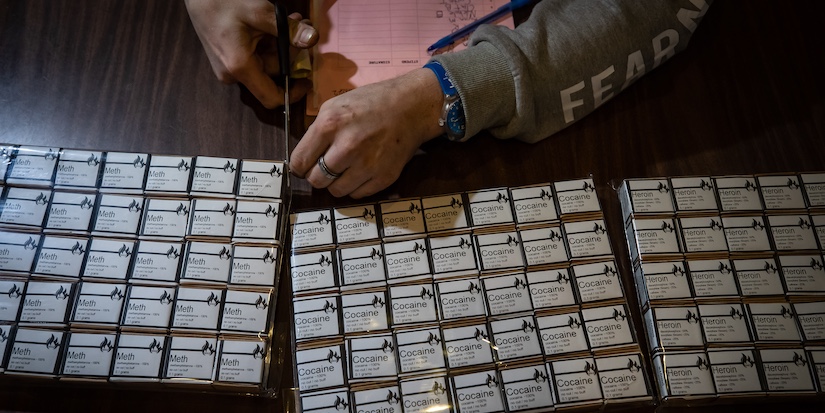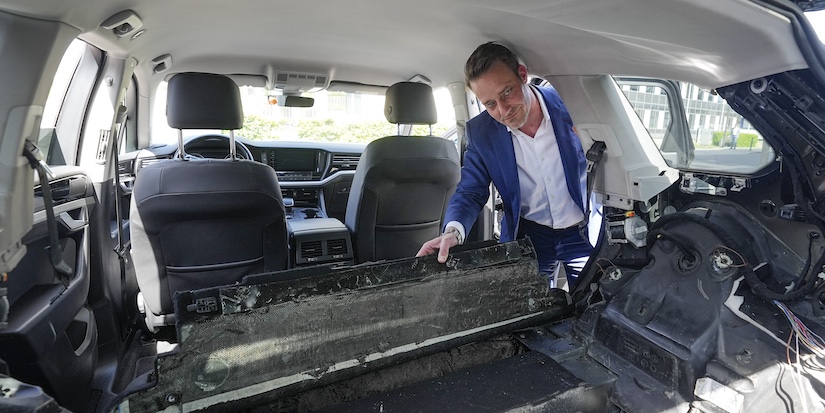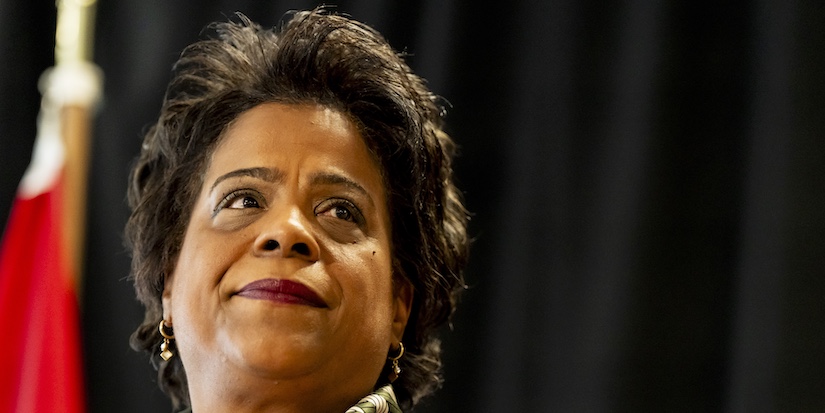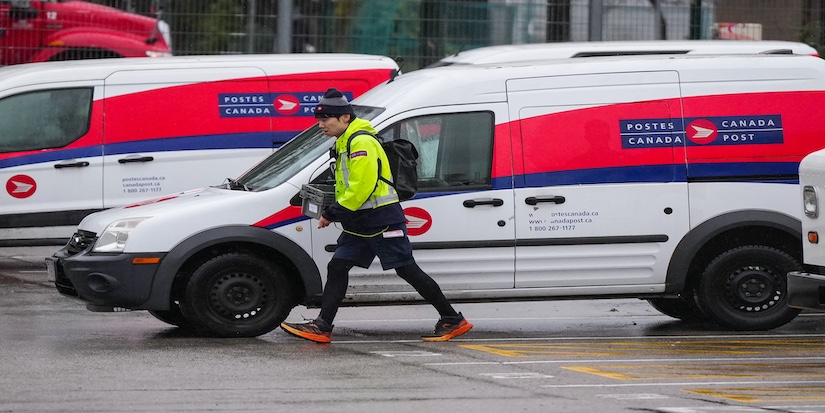Latest News
Amputee CHAMPS share tips and encouragement
Published 4:45 PDT, Fri April 5, 2019
Matteo Pellizzari was clear: “Make sure when you write (your story) that you put something that highlights sledge hockey. It’s definitely the most important thing.”
The 12-year-old plays often, usually with older players, and sometimes with the national team. His goal is to play for Canada at the Paralympics.
Between March 15 and 17, War Amps Child Amputee Program (CHAMPS) sponsored a BC Child Amputee Conference at the Sheraton Vancouver Airport Hotel in Richmond for kids like Pellizzari. He’s one of the organization’s champions or CHAMPS, outstanding examples of children with amputations who excel.
This two-day seminar offered peer support, workshops for child amputees, and networking.
Sara LaBelle, 21, volunteers as a CHAMPS junior peer counsellor. Her right leg was amputated when she was aged four because of a medical condition.
“At the seminars, we support the younger CHAMPS and parents,” LaBelle says. “We offer practical advice and serve as a representative of the organization as well.”
In addition to being an attendee, Pelliizzari is also a volunteer with the organization. He describes the people who go to the seminars: “It’s just everybody that the CHAMP program helps. All of the CHAMPS throughout Canada have these seminars in their provinces so, we have the BC seminar. Lots of kids from BC and Yukon come so that we can exchange tips. We’re all similar; we all have an amputation one way or another.”
Workshops deal with topics such as staring, bullying, and healthy habits.
“It’s just everybody talking to each other with the experienced CHAMPS. The organizers have sessions we go to where they explain things and share tips, like what to do and what not to do,” says Pelliizzari.
Asked for an example, he says, “What to do: go to the prosthetist (a specialist in prosthetics) to get a check-up every month-ish to keep your prosthetic in good shape and your residual limb in good shape because that’s all you have left so you have to make sure it’s not going anywhere.”
LaBelle says War Amps has done a lot for her.
“I’ve been almost 18 years an amputee. Growing up I’ve just attended my sixteenth seminar. Every time I go, I learn something new and make new friends. It’s such an amazing opportunity.”
She outlines some of the seminar topics she’s participated in or led: “Starting schools, starting a new activity, what devices are available for it, tricks others have done—I’ve learned tricks for skiing.”
For children, they cover topics such as entering high school and how to deal with teasing, she says.
Pelliizzari says the seminars have been really helpful, teaching him “how to take advantage of your leg or arm and how to stop thinking of it as a disadvantage.”
“The theme this year was ‘Just the way I am,’ so you talk to people. Everybody has differences,”
he says.
Talking of her amputation at a young age, LaBelle says she grew up with an artificial limb.
“I’m sure it was hard on my parents since they had to make the decision (to amputate). They got in touch with War Amps before my amputation to see what it’s like. And then we did the amputation the same year.”
The association has provided more than emotional support and advice. In both cases, War Amps has provided additional artificial limbs such as waterproof legs, ones that don’t have as many features but you can use to shower, swim and hang out at the beach.
Pelliizzari has special legs for running, donated by War Amps through the CHAMPS program.
“My running legs, which are often the main attractions, have a carbon fibre curve that has an energy return. They kind of lurch me forward. I can’t stand on them. That’s the point; they
propel me forward, helping me to run a lot better. My normal prosthetic legs don’t give me as much bounce. I’ve had them since I was very little.”
Pellizzari says he has an active life, from golf and volleyball to skiing and swimming.
Each activity can rely on a different kind of leg. Each artificial limb can cost thousands. Since he is a double amputee, in Pellizzari’s case, all costs are times two.
“War Amps has paid for pretty much all that I need. I’m so grateful. I wouldn’t be able to do almost all the things I do without War Amps,” he says.
But his passion is sledge hockey, he says.
“I really, really like sledge hockey and I’m really good at it. Not to toot my own horn, the nationals have their eye on me.”
It’s a big part of his life, he says.
“I do it about three times a week. I play with adults because B.C. hasn’t really gotten a grip on it yet. They have a team but it’s not anywhere near Ontario and Quebec. They have it down to a fine T. That’s a big thing there for disabled people.” He says he usually plays forward centre.
LaBelle is currently studying at UBC, and lives a “pretty normal life these days,” she says. “I go to school, hang out with friends. I can ski. I can drive.”
Pellizzari is finishing elementary school and says he’s been really lucky.
“My school’s really good. I’ve never been teased or bullied even remotely.”
But he recognizes that’s not the case for everyone.
“Some people have horror stories. All my friends are really supportive. They’ll explain my leg, and what happened, for me. The social aspect is a big part of having an amputation. It provides so much more for you. It stops bullying. Having a friend can put your spirits higher. They can explain your amputation for you and that can just make your day, right?”
War Amps helped LaBelle with driving lessons and university where she studies biology with an eye to working in health care.
“Because I am so used to being in a hospital and helping people, I personally prefer working with children. It would be amazing to work at BC Children’s Hospital some day.”
What would she say to someone facing an amputation?
“Don’t let it hold you back. You can really do anything if you want to. Science is only getting better. The sky is the limit for what you can do.”
She cites a personal example: “I work summers. Last year I worked in a restaurant. I was pretty concerned going into it knowing I’d be on my feet all day but it absolutely gave me the confidence to know I can stand on my feet and be fine. It was a pretty good experience for me that way.”
What does Pellizzari want to do when he grows up?
“I really like public speaking and writing. I want to be a news anchor or to write movies.”
Asked if his life is worse because he is an amputee, he replies with gusto, “No way! I don’t have to clip my toe nails.”
It’s not just War Amps who’ve made the difference for these two young people. Both credit their families.
“Obviously, my parents know that I have all the capabilities of anyone without a disability,” says Pellizzari.
LaBelle speaks of her parents, “They’ve tried to instil in me that you can do anything. It doesn’t have to hold you back.”
And, thanks to War Amps, LaBelle says, “You have the means to do anything you want.”






























